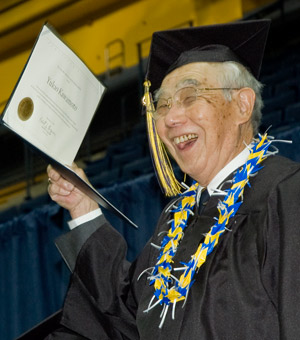Japanese Americans receive honorary degrees, 67 years after WWII internment cut short their studies at Berkeley
| 16 December 2009
BERKELEY — Forty-two former UC Berkeley students now in their eighties and nineties have finally received the campus degrees they had been working toward nearly seven decades ago, when Japanese Americans were sent to internment camps in the midst of World War II.
"I'm just glad to see my grandma and my dad be able to be represented in graduating, after what happened. I'm happy," declared 12-year-old Nathan Tokuno at an honorary luncheon preceding the formal ceremony.
The Honorable Norman Mineta — who was interned as a child, earned a Cal degree in 1953, and went on to become a U.S. congressman, U.S. commerce secretary, and then secretary of transportation — gave the convocation keynote address. "The journey from 1941 to 2009 has been a long one for our community," Mineta told close to 7,000 graduating seniors (young and old) and their supporters. "We struggled to rebuild our lives after the internment. We struggled to build a new place for ourselves in the American family."
Under Executive Order 9066, issued by President Franklin Roosevelt in early 1942, people of Japanese ancestry were forcibly removed from the West Coast. Mineta and his family were sent first to a Southern California racetrack and then to a relocation camp in rural Wyoming. "For me, as an 11-year-old, it was the first time I ever saw my father cry," he said of the Japanese attack on Pearl Harbor that precipitated and helped justify the internment. "He couldn't understand why the land of his birth was now attacking the land of his heart." Mineta was instrumental in the passage of the Civil Liberties Act of 1988, which led to formal apologies for the wrong done to citizens of Japanese ancestry by the internment, as well as financial compensation.
 Yukio
Kawamoto celebrates his freshly minted Cal diploma. (Cathy
Cockrell/NewsCenter photo)
Yukio
Kawamoto celebrates his freshly minted Cal diploma. (Cathy
Cockrell/NewsCenter photo)Associate Professor Duncan Ryuken Williams, chair of the campus's Center for Japanese Studies, spoke at the luncheon of the "courage and perseverance in the face of adversity" of those one-time UC students "whose educations and lives were disrupted in 1942 by war, war hysteria, and the abrogation of civil rights."
With the internment order, some 120,000 individuals — more than 2,500 of whom were students at California public colleges and universities — were forced to leave their homes, farms, and businesses on short notice for fairgrounds, migrant quarters, warehouses, racetracks, and stables in the interior. UC estimates that close to 700 Japanese American students on four of its campuses, some 500 of them at Berkeley, were impacted by the internment.
Williams referred to lesser-known acts of heroism and integrity associated with the internment. Honoree George Ichiro Nakamura, he noted, was killed in action in the Philippines even as members of his family were incarcerated behind barbed wire "by the same U.S. government he so loyally served." UC President Robert Gordon Sproul, he said, led a group of faculty from Berkeley opposed to the internment, forming the Committee on American Principles and Fair Play.
"This acknowledgement and ceremony comes a little bit too late," Williams acknowledged with irony — primarily because "so many of our honorees have passed on. But we are here today to right a wrong.”
Each honorary diploma bestowed Sunday bore the name of its Japanese-American recipient, along with the Latin inscription Honoris causa inter silbas academi restituere justitiam — "to restore justice among the groves of the academy."

